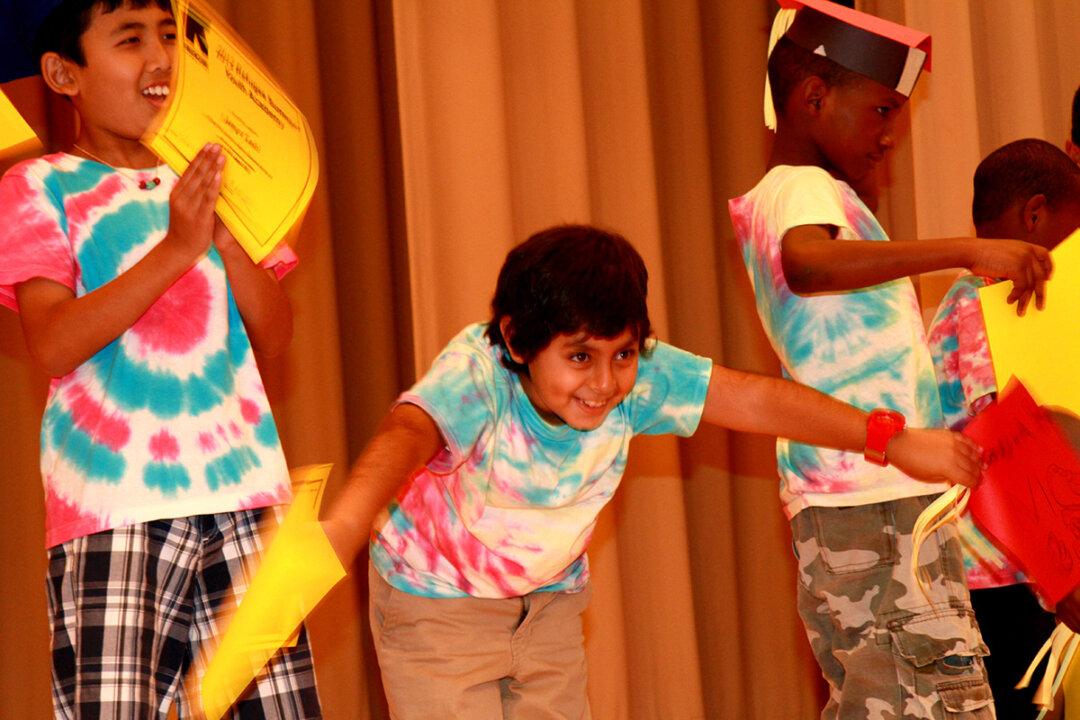NEW YORK—”No crying?” Khadijah Abdul-Nabi said. “No crying, ok?”
Such words usually achieve the opposite of the intended effect. The student was wiping her eyes as she walked away from Abdul-Nabi.
It’s also surprising to hear such words at a graduation ceremony, especially if it is for a six-week summer academy.
But this isn’t an ordinary academy. And these aren’t ordinary tears.
Another boy, tough and wide-shouldered, looked steady on approach, but melted on his teacher’s shoulder.
These aren’t ordinary students either: from kindergarten to high school, from Bhutan to Zimbawbe—they are refugees and asylum seekers, some official and some of the kind no paperwork can describe.
But they don’t talk about that around here.
“We don’t encourage them to talk about their stories because sometimes they come from a traumatic past,” Abdul-Nabi said. “What we choose to create is a safe space. If they choose to tell us their story they can.”
Things are complicated enough as it is: to a 13-year-old, downtown New York City is another world compared to Kaluga, Russia, or Burma, or North Korea. Especially if you had fled, instead of just departed—fled from fear, hate, desolation, or ignorance.
But they don’t talk about that around here. Instead they have fun and lots of it. On Aug. 16, performing at their graduation, two dozen little boys and girls moved their curled fingers to the “ch, ch, ch” tempo of the beaver song.
“Beaver one, beaver all, let’s all do the beaver crawl.”
“Ch ch ch, ch ch ch …” they sang, each with a different kind of smile, from Guinea to Tibet, on stage at Murry Bergtraum High School.
“Beaver two, beaver three, let’s all climb the beaver tree.”
“Ch ch ch …” little fingers moving up and down like climbing a tree.
“Beaver four, beaver five, let’s all do the beaver jive.”
“Ch ch ch …” as they swiped their fingers across their faces.
There are 120 students, from every corner of the world.
“The first day, it’s always chaos,” Sara Rowbottom, a program administrator, said. “We have staff positioned by the subway exits to help the students figure out how to get to school.”
It takes a few weeks to get settled: learning when is lunchtime, what is a cafeteria and how to find it. At first, they are shy and reserved. But before long they start singing, dancing, high-fiving, smiling, and making friends.
“Beaver six, beaver seven, let’s all go to beaver heaven.”
“Ch ch ch …” they sang and flapped their little arms like wings.
“Beaver eight, beaver nine, STOP! It’s beaver time!”
The sound of their names could be a song of their own: Khine Phyu, Hor Chok, Phurbu Tsering, Jinpa Songmo, Presusgay Tamang, Lulya Mekonen, Lingfan Zhang. And when they heard their names, it was all smiles, pride, bows, and handmade graduation hats.
The schools’ chancellor, Dennis Walcott was there. So were the volunteers who made it possible, more than a hundred of them. So were the parents and teachers, who held back enough tears to go around for everyone.
“It was amazing, it almost brought me to tears,” said Janet Rhi. “Just seeing their courage and their strength to do that.”
Seeing his son on stage was a moving moment for Sean Lengor, a gentle, soft-spoken man of African decent who grew up in Russia. He fled from Russia nine years ago, menaced by racism from his own countrymen.
“I’m really glad to see my son making friends,” Lengor said.
His son, Leon, and his wife, Natalia Sibirtseva, joined him two years ago.
The Refugee Youth Summer Academy, in its 14th year, immerses kids in an American school environment: there are math, art, and other classes, homework and field trips. And there’s that moment when the school day is over. But this time it’s for good, at least until next summer.
And so they danced, and sang, and goofed around one last glorious time.
No one seemed to care for the bumbling and missed steps on the stage. Not the audience: the parents, teachers, volunteers, and those like Bassiorou Kaba, who after being cared for, came back to help care for others.
“The most memorable thing? Just being here,” Kaba said.
The three older classes performed the same song, each in their own way for the grand finale.
“If you want to sing out, sing out. If you want to be free, be free,” the first class sang the Cat Stevens song as a teacher played the ukulele.
The next group of kids sang the same tune to percussion, and the next added their own lyrics.
“Well if you want to be me, be me. And if you want to be you, be you.”
Suddenly, the entire school poured onto the stage and sang it all together.
“Well you can make it all true. And you can make it undo.”
Oddly, instead of getting louder, the voices became softer. One by one, it seemed they were beginning to realize, as their expressions grew serious and solemn, what the lyrics they had practiced for weeks really meant. The goose bumps from their quiet epiphany spread like an electric current over the audience.
“Well if you want to sing out, sing out,
And if you want to be free, be free,
‘Cause there’s a million things to be,
You know that there are.”
And even more quietly then:
“You know that there are,
You know that there are,
You know that there are.”
A silence filled the auditorium, followed by a thunderous applause.
Follow Ivan Pentchoukov on Twitter @IvanPentchoukov.
Refugee Kids Transition to New Ground at Graduation Ceremony
NEW YORK—”No crying?” Khadijah Abdul-Nabi said. “No crying, ok?”

Graduates from the Refugee Youth Summer Academy celebrate on stage at the Murry Bergtraum High School in Lower Manhattan. Ivan Pentchoukov/Epoch Times
|Updated:




